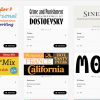Choosing the right construct to create a website requires an understanding of the myriad choices. The most common options lie between open-source, do-it-yourself platforms – like WordPress – and customized websites.
The pros and cons between the two depend on a variety of factors, including speed, cost, maintenance and functionality. The optimal choice is usually the one with the amenities that most align with the needs of the company as well as the budget for the project.
WordPress
WordPress is an open-source platform that allows users to create websites using templates. WordPress offers e-commerce, mobile website and self-hosted solutions that makes content management easy. As is the case with any online tool, there are benefits and drawbacks to using WordPress, depending on need.
Pros
- Cost: WordPress is a cost-effective way to get a website up and running quickly. One of the most common reasons businesses avoid establishing a web presence is the expense. WordPress mitigates that issue by offering a platform for the do-it-yourselfer with pre-designed templates. This keeps the cost low and set-up process simple.
- Programming: Simply put – coding experience is not necessary to set up an aesthetically-pleasing website. In fact, this is the appeal of the WordPress platform and one of its main marketing points.
- Template Diversity: When WordPress first launched, it was a fairly rudimentary platform. It has since expanded to include creative templates that can accommodate just about any business type and are easily customized.
- Ease-of-Use: WordPress allows users to maintain a website without the need to consult a professional designer. This means that businesses can quickly update anything from product price points to important customer announcements.
- Extendable: At the time of this writing, there are currently almost 40,000 plugins available to extend the functionality of WordPress. This means that no matter how specialized your needs may be, chances are there is a plugin available that will do the job.
- Ongoing Development: WordPress is constantly being improved upon by a large community of developers. New updates are released regularly.
Cons
- Security Challenges: One of the biggest drawbacks of WordPress is the security vulnerability of the platform. When one website has a security breach, all others can be impacted because of the way that the WordPress network is structured. This compromised degree of security is a significant drawback of WordPress.
- Standardized Designs: Because WordPress relies on templated designs, it’s challenging for businesses to create a DIY highly customized website. While the information may be specific to the business, the design components of the template are shared among thousands of users.
- Function Limitations: While WordPress has more extensive offerings than ever, it is still limited by its DIY functions. There are also limits on design options and functionality.
- Speed: Because WordPress is home to so many websites, speed is sometimes an issue. Known in the industry as “bloatware,” these various plug-ins and tools give every user the same opportunity for development. The sheer volume of products can significantly impact loading speed for all sites hosted on WordPress.
- Maintenance: WordPress must maintained. This means that WordPress core as well as all plugins and themes must be kept up to date to ensure ongoing security and optimal functioning of your website.
- Bloat: WordPress is an extremely large platform. For this reason, WordPress sites tend to be very resource-intensive and, thus, can result in a slow user experience. The more plugins you have, the more bloated and slow your website is likely become. If you plan to have a WordPress website, plan to go with a Managed WordPress host. Their services are usually tailored for and optimized to run WordPress.
Custom Website Design
Custom website design may come at a higher cost, but for businesses that depend on a solid web presence, it’s a sound marketing investment. A custom design ensures a website that looks professional and functions well. It allows a brand to truly infuse its imprint on its site, establishing a dominant online presence.
Pros
- Security: Custom websites have a more stringent approach to security than open-source platforms. Working with a designer or company on a custom site means that you are working within a closed source network and are thus less likely to be victim to a widespread breach.
- Maintenance: A DIY approach is not always the most effective option. Ongoing maintenance through a professional website designer ensures that updates are properly scheduled, functionality is not compromised by changes and the website looks professional.
- Creativity: Being distinctive in business is not just ideal; it is essential for success. A custom website allows companies to get away from templated designs that have been replicated on numerous other websites.
- Content: A custom website design package is generally accompanied by other supplemental services. For instance, quality content is key to maximize website effectiveness; working with a professional content creator through a website design company assures content that gets results.
Cons
- Cost: A custom website design is usually more costly than the WordPress option and small businesses may not be prepared to incur the expense.
- Time: More time is needed for the development process as well as any future modifications to the site.
- Contract Complexities: A customized website design means that a contract must be established, negotiated and followed to ensure a coordinated approach to the design and development process. This adds more time to the process, however, which is why it is a drawback of going in this direction.















